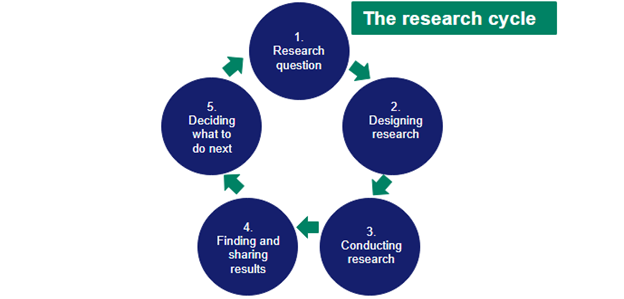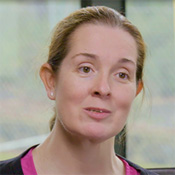Getting into research
Research helps us try and explain things. It can help us understand the impacts of a new treatment.
There are many ways you can make a difference through research.
You might be considering getting involved in research. Or you might have a lot of experience and want to help others get started. You may choose to help co-design the research as part of a research team. Or participate in a research study.
Here are answers to some of the questions you might have.
What difference can I make?
You can make a difference at every stage of stroke research. As part of the research team you can:
- help choose the research question and what is measured
- share the results or
- decide what questions to study next.

(Adapted from Consumers in Research Training (Cancer Council NSW).)
What kinds of involvement are there?
There are many ways to be involved:
- Lived-experience contributor is someone who is an expert because of what they’ve gone through. They may have had a stroke, or they are a carer or family member of a person who has had a stroke. Consumer is often also used to describe people with lived experience.
- Research participant is someone who contributes data to the study. This could be something physical, or their views through surveys or focus groups. Study recruit is another name for a participant.
- Patient is someone who is getting treatment from a health professional, usually in hospital. Patients can also be part of research, as long as ethics protocols are followed.
All types of involvement are valuable.

“I would like to think that I survived to make a difference in this world. And if that’s by doing research or helping research to exist and…I change just one person’s life, that means I’ve done what I was meant to do.”
– Brooke Parsons, lived-experience contributor.
What’s it like being involved with a research team?
Hear stories from lived-experience contributors and researchers:
You can find more consumer stories and advice at the Australian Clinical Trials Alliance.
How do I get started working with researchers?
If you're thinking about getting into research as a lived-experience contributor, check out our e-learning module on working with researchers.
The module takes about 30 minutes to complete. It includes tips from other people impacted by stroke, and the researchers they work with.
Are people paid to do research?
Sometimes people are paid, depending on the project.
When possible, projects reimburse expenses. This can include travel or parking. There may also be a gift or contribution fee to recognise people’s expertise, time and effort.
However, it depends on how the work is funded. Often researchers are employed by an organisation, with funding from a grant or fellowship. But sometimes the research is done by students as part of their tertiary course, and funding may be limited.
The organisation behind the research may have their own policy on contribution fees.
However, lived-experience contributors can also decline contribution fees if they wish.
Other guides for supporting and recognising lived-experience contributors can be found at Health Consumers NSW and Consumers Health Forum of Australia.
Where can I find support?
Being involved in a research study may bring up things about your past experience that could be challenging or distressing. If you need support it is important to talk to someone about how you are feeling.
You could talk to a family member or friend. Or you could talk to your doctor, therapist you trust, a psychologist, or you can call the Stroke Foundation’s StrokeLine or Lifeline.
If you feel comfortable, you could also talk with one of your research peers or colleagues.
Where can I find opportunities to get into research?
You can find research opportunities at:
- Join Us - Stroke Foundation is proud to partner with Join Us. Sign up to be notified of health research that matches your interests, and help us continue our work. Sign up here.
- Projects recruiting on Stroke Foundation is where we list projects that researchers have contacted us about. We often put these in our newsletter, which you can receive if you register for EnableMe.
- The George Institute’s Join Us, a secure register where you enter your details to be matched with studies as a participant.
- Local consumer groups, e.g. Health Consumers New South Wales.
- Healthcare organisations, e.g. hospitals and GP practices.
- Universities and research institutes, e.g. Hunter Medical Research Institute has its own Stroke Research Register.
Some research is also advertised in newspapers or on social media.

